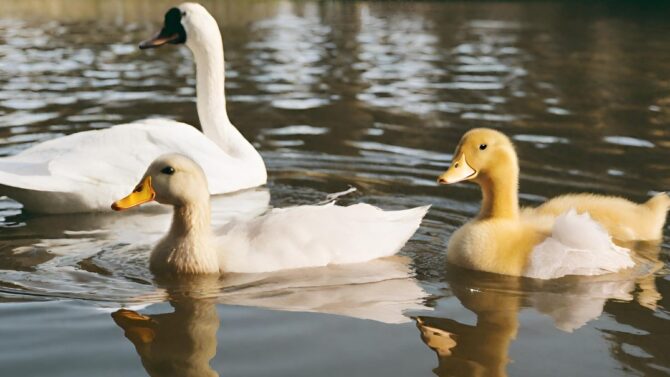I vividly recall my first interaction with ducks; it was on a school trip to a local pond. One duck, with a striking blue patch on its wing, waddled up to me, probably expecting some treats. Innocently, I shared my sandwich bread with it.
It wasn’t until later that I learned about the damage that I could have caused and I felt so bad!
Therefore, today I want to share the insights I’ve gathered about what these birds eat in the wild and as pets, hoping to spread knowledge and love for our feathery friends (and stop you from making the same mistake).
The Basics of Duck Diet
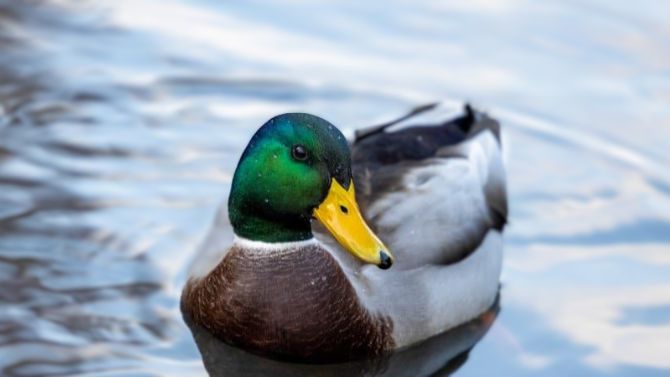
Ducks are omnivorous birds, which means they eat a variety of foods ranging from plants to small aquatic animals. While their dietary choices depend largely on availability, there are some commonalities in what they prefer.
Plants and Vegetation
These birds often consume a variety of plant materials. From the tiniest of seeds to the greenest of algae, plants form an essential part of their diet.
Wild ducks will commonly graze on aquatic plants, seeds, and even small fruits that grow near ponds or lakes.
This is particularly true for dabbling ducks like Mallards. They paddle on the surface of the water, tipping forward to munch on underwater vegetation. For pet ducks, greens such as lettuce, kale, and spinach are great dietary additions.
These provide the necessary nutrients and are usually well-received. Just like humans, they need a variety of veggies for balanced nutrition.
Aquatic Creatures
Water bodies are a buffet for these birds. Lakes, ponds, and streams are teeming with life, and they take full advantage of this. In the wild, they eat small fish, tadpoles, and even small amphibians.
Insects like dragonflies, water beetles, and mosquitoes are a favorite, especially during breeding seasons when protein demand is high.
For those keeping ducks as pets, while it may not always be feasible to offer live aquatic prey, supplementing their diet with high-protein feed or occasional worms can be beneficial.
Mealworms, for instance, are a duck delicacy and great for a treat!
Which Factors Influence Their Diet?
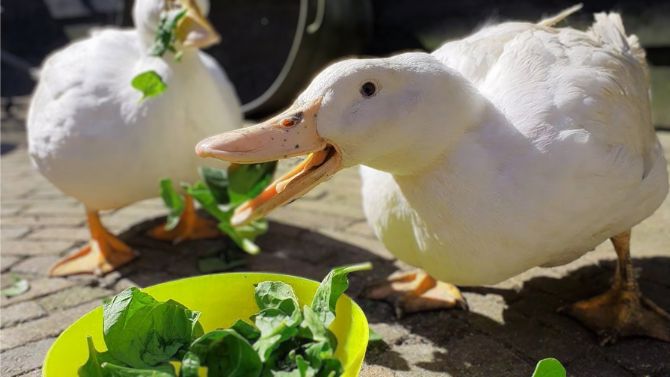
Different environments and stages of life necessitate diverse dietary choices. Whether it’s seasonal changes or growth needs, they adapt their eating habits accordingly.
1. Seasonal Changes
As seasons shift, the availability of certain foods changes, leading ducks to modify their dietary habits. During spring and early summer, they will lean more on protein-rich diets, consisting mainly of aquatic insects and small fish.
This is because many of them are nesting during this period, and protein helps in the development of their eggs. Come fall and winter, when insects become scarce, ducks shift towards consuming more vegetation.
Seeds, aquatic plants, and grains become a primary source of nutrition. This helps them gain the necessary fat reserves for the colder months.
2. Age and Growth
Just like any other creature, these birds have different nutritional needs at various stages of their life. Ducklings, right after hatching, require a protein-rich diet for rapid growth and development.
In the wild, they mainly consume small insects.
For domestic ducklings, specialized starter feed is recommended to ensure they get all the necessary nutrients. As they transition into adulthood, the protein requirement decreases, and they start eating more plants and grains.
For pet ducks, switching to a balanced adult duck feed after the first few weeks is essential.
Common Misconceptions
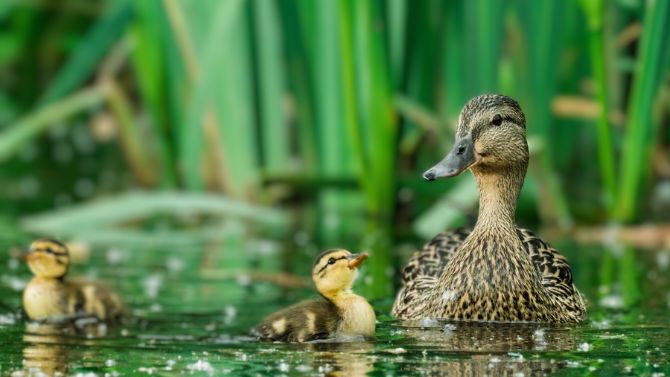
Several myths surround what these birds should or shouldn’t eat. It’s crucial to dispel these myths for the well-being of our feathered friends.
The Bread Myth
One of the most prevalent myths is that feeding ducks bread is acceptable. We’ve all seen those heartwarming scenes in movies or parks where families toss breadcrumbs to eager ducks.
In reality, bread offers little to no nutritional value for them.
Consuming bread can lead to malnourishment and other health problems. In ponds, uneaten bread can also rot, leading to an increase in harmful bacteria and algae, affecting the overall ecosystem.
For pet duck owners, while it might be tempting to treat your pet with bread scraps, it’s best avoided. Instead, focus on providing a balanced diet with the necessary nutrients.
Only Water Plants are Enough
Another common misconception is that these birds can survive solely on aquatic plants.
While it’s true that many ducks consume a significant amount of vegetation, they also need proteins, fats, and other nutrients that aquatic plants alone cannot provide.
In the wild, they balance their diet with insects, small fish, and even crustaceans.
Pet ducks also require a balanced diet. Simply relying on greens will not suffice. They need specialized duck feed and occasional treats to ensure they’re getting all the essential nutrients.
Special Considerations for Pet Ducks
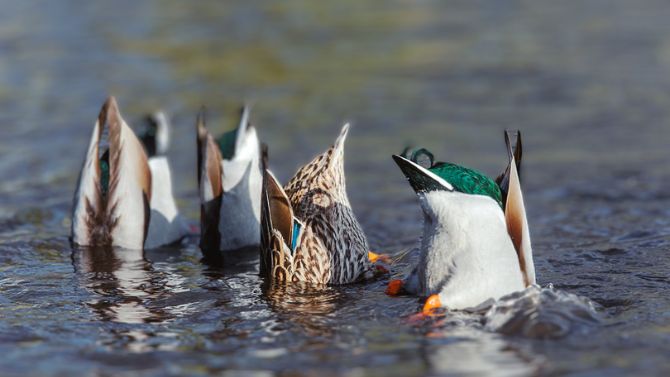
Keeping ducks as pets is a rewarding experience. However, they have unique needs that differ from their wild counterparts. Being aware of these needs ensures a long, healthy life for your pets.
Supplements and Vitamins
Domestic ducks may not have access to the diverse diet that wild species enjoy. To ensure they receive all the necessary nutrients, supplements can play a crucial role. Calcium, for instance, is essential for laying ducks.
Without adequate calcium, they can suffer from weak eggshells or even egg binding, a potentially fatal condition. Oyster shells or crushed eggshells can be offered as a calcium supplement.
Vitamins, especially niacin, are crucial for ducklings’ growth. A deficiency can lead to leg issues. While many duck feeds include necessary vitamins, double-checking and considering supplements if needed is always a good idea.
Provide Them with Water, Not Just for Drinking
Water is integral to a duck’s life. Beyond mere hydration, these birds use water for cleaning, playing, and foraging. They naturally dabble in water, filtering out food particles.
Even if you’re feeding them a commercial diet, having a water source where they can exhibit this natural behavior is beneficial.
Additionally, they need water to clean their nostrils and eyes and to aid in digestion. For pet duck owners, providing a kiddie pool or a similar water source can keep your pet happy and healthy.
Ensure the water is clean and refreshed regularly.
Potential Health Issues from Poor Diet
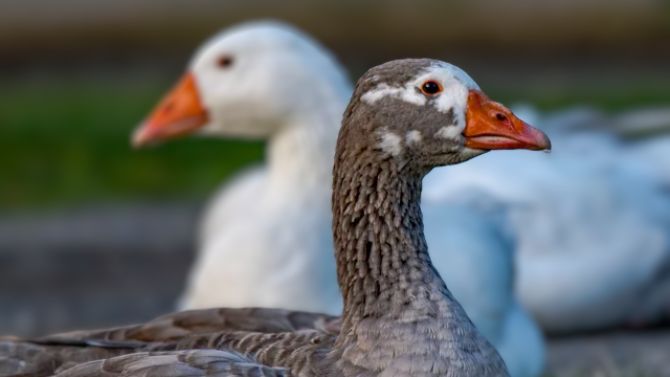
Ducks, like any other creature, are susceptible to health problems if not provided with a proper diet. Recognizing potential issues can help in early intervention and treatment.
Angel Wing
One of the most common dietary-related issues in these birds is a condition called Angel Wing. It’s characterized by the last joint of the wing pointing outwards, rather than lying flat against the body.
Angel Wing is believed to be caused by a diet too high in proteins or carbohydrates and too low in vitamins and minerals.
While often seen in wild ducks due to improper feeding (like bread), pet ducks can also be affected if not given a balanced diet. Early detection and intervention, including dietary adjustments and physical therapy, can often correct the issue.
Obesity
Just like humans, these birds can become overweight if fed improperly. Overweight ducks are at risk for a host of health problems, including heart disease and joint issues. Foods high in fat or sugar, or simply overfeeding them, can lead to obesity.
It’s essential to monitor your duck’s weight and adjust their diet accordingly. For pet ducks, ensuring they have ample space to move, forage, and play can help prevent weight gain. Regular vet check-ups can also assist in monitoring and maintaining their ideal weight.
FAQs
Can ducks eat regular poultry feed meant for chickens?
While they can eat chicken feed, it’s not ideal as their sole food source. Duck-specific feed is formulated to meet their unique nutritional needs.
If you must use chicken feed, ensure it’s non-medicated and consider supplementing with additional nutrients, especially niacin, which ducks require in higher amounts than chickens.
How often should I feed my pet ducks?
Adult duck typically eats twice a day – once in the morning and once in the evening. Ducklings, due to their rapid growth, need to be fed more frequently.
Always ensure that water is available, as they need it to help swallow and digest their food.
Do ducks eat meat?
In the wild, they will occasionally eat small fish, insects, and other aquatic creatures, which can be considered a form of meat. However, it’s not typical for these birds to consume larger animals or land-based meats.
If offering meaty treats to pet ducks, ensure it’s in moderation and appropriate for their size and species.
Is it okay to feed ducks dairy products?
Ducks, like many birds, are lactose intolerant, which means they can’t digest dairy products properly. While small amounts might not cause immediate harm, regularly feeding them dairy can lead to digestive issues.
It’s best to avoid dairy products in their diet.
My duck seems to have lost interest in its food. What should I do?
Ducks can be picky eaters at times. First, ensure the feed hasn’t gone stale or spoiled. If the feed is fresh, try introducing some variety or changing the brand of feed.
If the duck continues to show disinterest or displays signs of illness, consult a veterinarian.
Sometimes, a loss of appetite can indicate underlying health issues.
The Bottom Line
Ducks bring so much joy, with their playful antics and calming presence. It’s our responsibility to ensure they thrive, whether in the wild or in our backyards.
For those who enjoy feeding wild ducks, always choose foods that are nutritious and beneficial.
Opt for grains like oats, rice, or birdseed over bread or junk food. And remember, feeding should be an occasional treat, not a replacement for their natural diet.
For pet duck owners, ensuring a balanced, varied diet will lead to a healthier, happier duck.
Be attentive to their needs, provide fresh water, and enjoy the delightful company of your web-footed friends.

